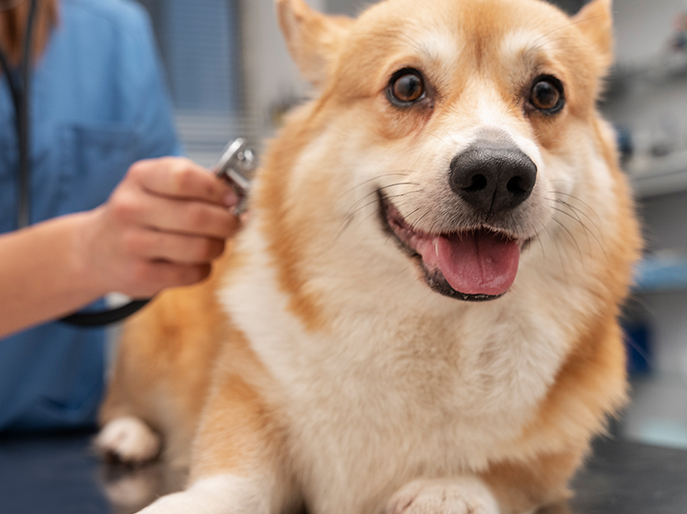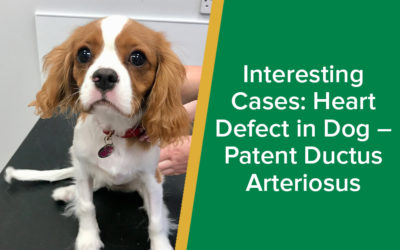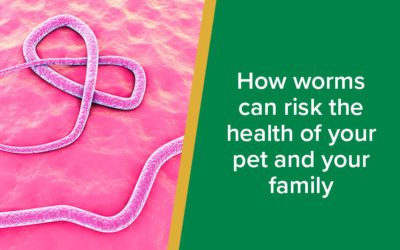Heart health is as crucial for our dogs as it is for us. If there is something going wrong with the heart and surrounding membranes, then the functioning of the whole body can be compromised.
Heart problems are varied and can be complex. It’s also made trickier by the early-stage symptoms often being vague or well hidden.
In this article we are going to cover the most common heart diseases in dogs as well as signs and symptoms, possible treatments, and how diet and exercise can help.
Heart disease can be:
• Hereditary, which means passed on through the parent’s genes.
• Congenital, where the defect is present from birth even if it doesn’t become noticeable until later in life.
• Acquired, where it develops as they age.

Common heart conditions in dogs
Common problems usually involve either the heart muscle (characterised by conditions with ‘myo’ in their name), the heart valve, or abnormal variation in the impulses that causes the heart to beat resulting in arrhythmia, or irregular heartbeats. When any of these things fail to function properly the result is the same – it limits the amount of blood that pumps around the body.
Symptoms at this stage include:
- Fainting
- Weakness
- Lack of energy/depression
- Laboured breathing
- Coughing
- Poor appetite
- Weight loss
- Swollen abdomen (ascites)

Diagnosing Heart Problems in Dogs
Once symptoms become apparent, we will suggest some of the following diagnostic tools to find out exactly what is going on and determine what the best course of treatment is:
- Blood tests to check for some specific heart-related markers, as well as key health markers that give a picture of general wellbeing and suitability for certain drugs
- X-rays can be useful to assess your dog’s heart and lungs. Often when a heart is having problems it will get larger and fluid may build up on the lungs and both of these are detectable by x-ray
- Another diagnostic imaging tool that can be useful is an ultrasound scan of the heart. This is called an echocardiogram. It is one of the most accurate methods of diagnosing heart disease and can be used to look at the heart working to see where the problems are. The heart’s walls, chambers, valves and blood vessels can be accurately observed as can blood flow
- Electrocardiograms (ECGs) can record the electrical activity of the heart and can be used to diagnose rhythm problems
Once we’ve decided on the best course of treatment for the diagnosed stage, we’ll then want to see your dog regularly to check on progress and the effectiveness of the treatment.
Treating Heart Conditions
Unfortunately, whilst most heart conditions can’t be cured, they can be well managed if they’re picked up early enough. Some heart conditions will not require treatment in their early stages but will need regular monitoring and check-ups.
Medicine is often a frontline treatment. Whilst they can’t cure heart disease or stop it progressing, they can slow it down, help the heart work efficiently, and reduce symptoms.
Exercise can also be beneficial for dog in the early stages of heart disease and keeping all our pets’ active helps with all aspects of health. It’s important to make sure the level and amount it right for a dog with heart disease, so we can work with you to make sure the balance is right.
Diet is also key to health and good nutrition can play an important part in increasing a dog’s quality of life, even once they’re diagnosed with heart disease. Dogs who are underweight should have a diet rich in proteins, and dogs carrying extra weight should be helped to slim down by limiting the amount of carbohydrates and fat they eat. If your dog has heart disease, we also suggest reducing the amount of sodium in their diet as it can contribute to a build-up of fluid in the chest that could make breathing more difficult.
Look for feeds that include taurine, omega-3, vitamin E and enzyme Q10 as these can help with heart health and circulation. We can advise you on the most suitable diets.

Heart disease treatment costs
Treatment for heart disease can be expensive as once treatment starts this will be for the life of your dog. We strongly recommend insuring your dog as soon as you become their guardian and picking insurance that covers the life of a condition. Insurance doesn’t usually cover pre-existing conditions, which is why it’s important to get covered before any diagnosis of conditions such as this.
Our healthcare plan is another way to budget for key preventive healthcare essentials that will help as keep your dog healthy and happy for the longest time possible. Check-ups with a vet are included so we’ll be able to keep a close eye on health and deal with any issues as soon as they become apparent.
Remember that if you’re a member of our Premier Pet Club you get UNLIMITED consultations.
Our healthcare plan is another way to budget for key preventive healthcare essentials that will help as keep your dog healthy and happy for the longest time possible. Check-ups with a vet are included so we’ll be able to keep a close eye on health and deal with any issues as soon as they become apparent.


